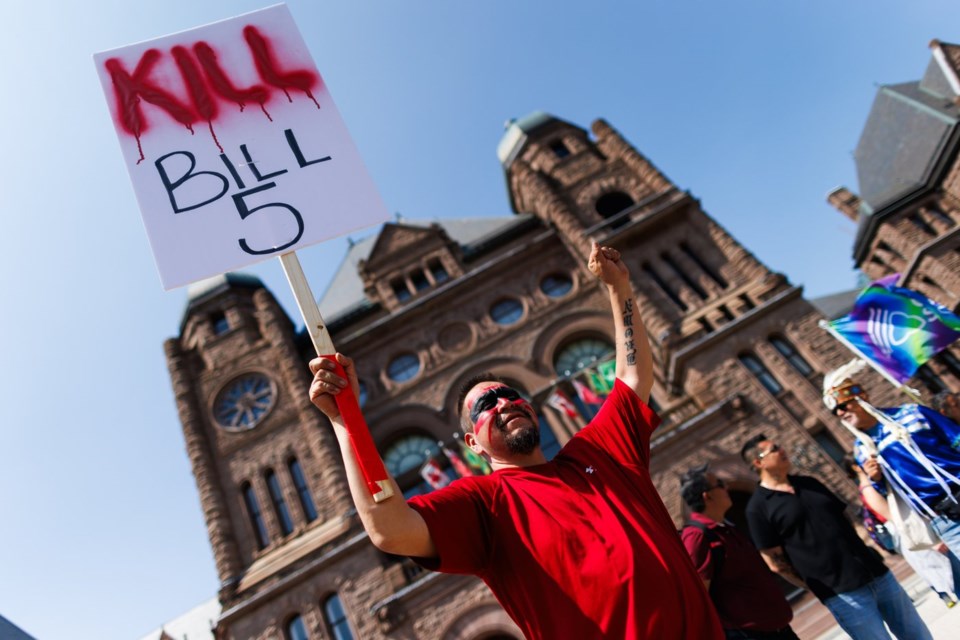TORONTO — Ontario Premier Doug Ford's government has given itself the power to suspend provincial and municipal laws for chosen projects in areas it deems to have economic importance, citing the need to speed up development of mines, but First Nations warn confrontation is brewing.
Known as Bill 5, the legislation sparked a firestorm of anger among First Nations communities, who say it tramples their rights and ignores their concerns. It may have passed in the legislature Wednesday, but Indigenous leaders say the fight is just beginning.
"Our diplomacy ends today," said NDP deputy leader Sol Mamakwa, who represents the northern Ontario riding of Kiiwetinoong that is home to many First Nations and the mineral-rich Ring of Fire region.
"You cannot trample on the rights of the people that live on these homelands and get away with it."
Ford has said the bill is needed to speed up large projects, particularly mines, in the face of U.S. President Donald Trump's trade war. Jeers from dozens of First Nations members echoed in the legislature as the bill was passed into law. Ford was not there for the final vote.
Nishnawbe Aski Nation Grand Chief Alvin Fiddler called the premier a "coward."
"This fight is not over, but we will meet you on the ground," Fiddler said. "He did not even have the guts to show up for the vote."
Ford was on a call with a Republican congressman during the vote, his office said.
Lake Huron Regional Chief Scott McLeod said that shows where the premier's priorities lie.
"His priorities are not with the Indigenous people in this province," he said. "They're with business people, and he wants the resources that are in our territories. He's selling our minerals and our resources to Americans, to the world, without our permission and that is what we're not going to stand for."
The government had tried to amend the bill to explicitly include duty to consult provisions, but delay tactics at the committee stage by the Liberals meant that the Progressive Conservatives passed the legislation without that.
Ford said earlier in the day that they would consult with First Nations over the summer, but that may now be in question.
From now on, Fiddler said, Nishnawbe Aski Nation will not take him or his government seriously, nor will they engage with Indigenous Affairs Minister Greg Rickford. Fiddler called for his resignation.
"He is supposed to be representing Indigenous affairs for our nation, but he failed at every turn, and we will not work with him," Fiddler said. "We will not engage with him at all moving forward."
The legislation will create so-called "special economic zones," where the province could suspend laws in order to speed up projects such as mines, and the government has said the Ring of Fire would be the first such zone.
Chris Moonias, the former chief of Neskantaga First Nation, suggested action will begin by preventing mining companies and others' access to their lands.
"We're going to shut down the Ring of Fire," he said. "Whatever that means, whatever we can do, we're going to shut it down. I promise you that."
Earlier in the day, Ford said blockades wouldn't be "very wise."
"You can't break the law," Ford said. "Simple as that. ... They need to move on or they'll be dealt with appropriately."
When asked to clarify his comments, Ford said he doesn't direct the police and any enforcement would be up to the Ontario Provincial Police or local police services.
The premier wouldn't say if he would use the notwithstanding clause to save Bill 5 if it ends up –°¿∂ ”∆µ challenged and found unconstitutional in court. But he said that he would "cross that bridge" when he comes to it.
Civil liberty groups are livid at the prospect of effectively lawless zones, and unions have warned that labour laws would be under threat.
The measure is part of an omnibus bill that makes a slew of other changes, including stripping protections for endangered and threatened species. Environmental groups and the Toronto Zoo have warned this will lead to extinctions.
Farmers, who largely support the Progressive Conservative government, have also spoken out against the bill. The Ontario Federation of Agriculture said the broad powers "could override vital protections for farmland and agricultural systems."
This report by The Canadian Press was first published June 4, 2025.
Liam Casey and Allison Jones, The Canadian Press




